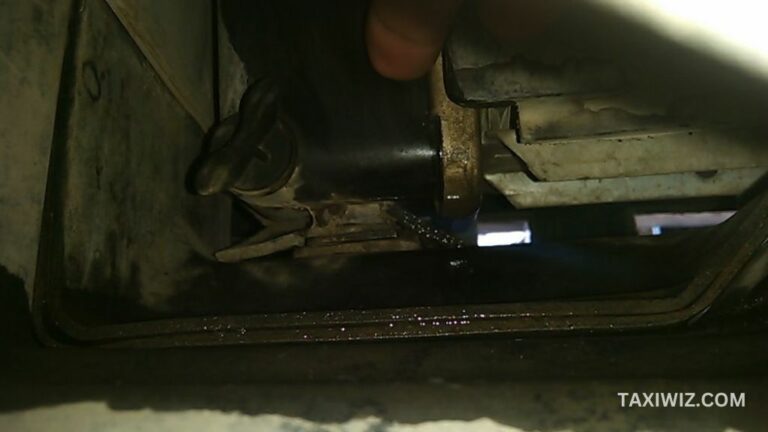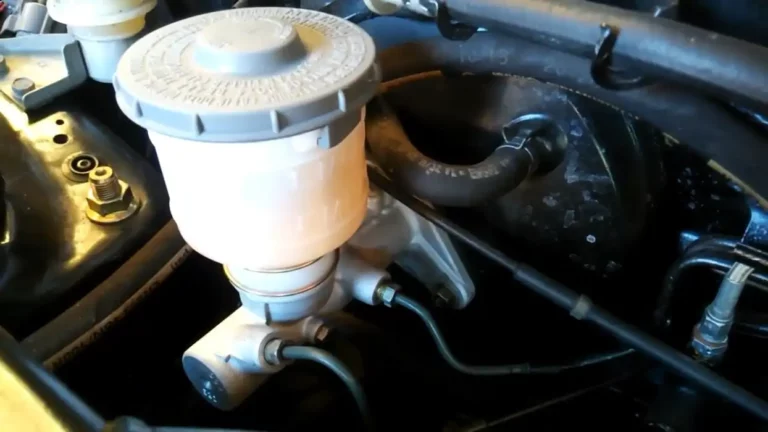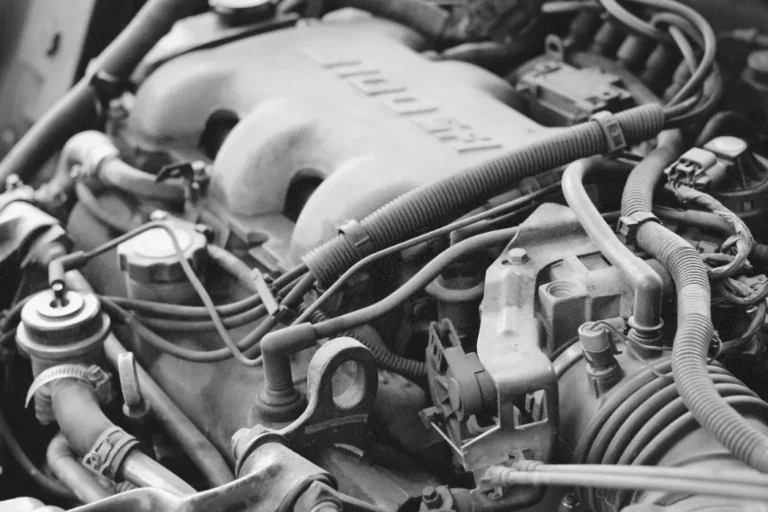10 Reasons Why Does My Car Thump When I Accelerate
Hearing a thumping sound when you accelerate your car can be alarming and stressful. The noise is annoying and may indicate a larger issue with your car’s drivetrain, suspension, or tires.
In this article, we’ll look at some of the most common causes of thumping sounds when accelerating and how to diagnose and fix the problem.
Why Does My Car Thump When I Accelerating
It could be caused by several factors, including:
- Worn or damaged CV joints
- Tire issues
- Transmission issues
- Faulty engine mounts
- Worn suspension components
- Bad starter motor
- Exhaust system issues
- Bad wheel bearing
- Bad drive shaft
- Damaged differential
Some of the issues are simple to fix, e.g., inflating tires but fixing drive train issues requires the expertise of a professional. Here are common reasons why your car thumps while accelerating with solutions.
1. Worn Or Damaged CV Joint
CV joints connect the transmission to the wheels and allow the wheels to turn. Over time, the protective rubber boot that covers the CV joint can crack, which allows dirt and debris to enter the joint. This, in turn, causes the joint to wear out faster than it should, resulting in a thumping sound.
Solution
Replace the CV joint to fix this problem. It’s essential to address this issue promptly to avoid additional damage to the drivetrain.
Related : Why Car Shakes When Pressing Gas Pedal?
2. Tire Issues
If you have ever driven with a flat tire, you know how much thumping occurs because the metal rim hits the ground. That is the same case when you have worn or damaged tires.
Tires can become unevenly worn due to improper alignment leading to vibrations. It could also be due to unbalanced tires.
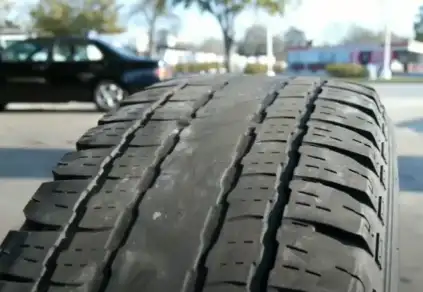
Solution
Replace worn or damaged tires. If the tires are misaligned or deflated, ensure you inflate and align them properly. Regular tire rotation and alignment can prevent uneven wear and extend the life of your tires.
3. Transmission Issues
Your car thumps when accelerating because of a faulty transmission mount and low transmission fluid.
The transmission mount is a component that holds the transmission in place and absorbs engine and drivetrain vibrations. The mount can become worn or damaged over time, causing the transmission to vibrate and make a thumping sound.
Other symptoms that may indicate a faulty transmission include:
- Clunking or banging noises when shifting gears
- Difficulty shifting gears
- Vibration or shaking in the cabin
- Transmission fluid leaks
Solution
If you suspect transmission issues cause the thumping sound, you should take your car to a mechanic. They will inspect the transmission and the mount and replace them if they are faulty. If the transmission fluid is low, they will top it off for you.
4. Faulty Engine Mounts
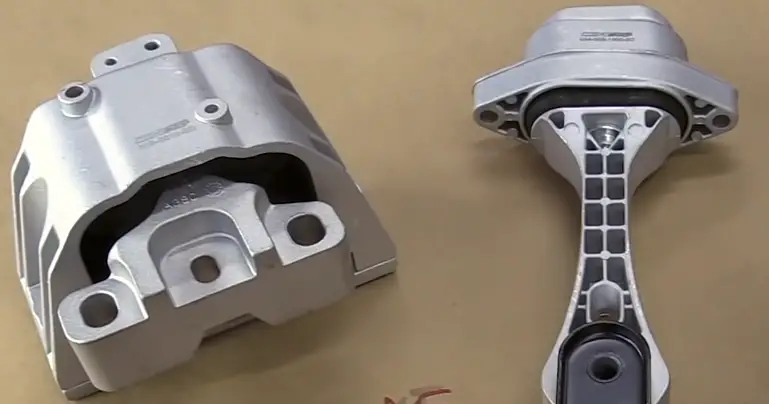
The engine mounts hold the engine in place and reduce the vibration transmitted to the rest of the car. If the engine mounts become worn or damaged, it can cause the engine to vibrate and create a thumping sound.
Solution
Replace the worn engine mounts with new ones.
5. Worn-out Suspension Components
Shocks or struts are part of the suspension system and are responsible for absorbing bumps and shocks on the road.
Struts are on the front wheels, whereas shocks are on the rear wheels. On the other hand, ball joints serve as a pivot point between the steering and suspension systems. These allow the wheels to move up and down as the suspension travels over potholes and bumpy roadways.
Over time, these components can wear out and lose their ability to work optimally. This can cause them to create a thumping sound. Here is a video for a better understanding.
Solution
Replace the worn struts, shocks, ball joints, and bushings with new ones.
6. Bad Starter Motor
If you notice the thumping sound coming from the front of your car, it could be due to a bad starter motor. The starter motor is responsible for turning the engine over and starting the vehicle. If the starter motor is failing or damaged, it can cause a thumping or grinding sound when accelerating the car.
Solution
Replace the starter motor with a new one.
7. Exhaust System Issues
A damaged or loose exhaust pipe can cause the exhaust system to vibrate, creating a thumping sound. Additionally, a clogged or damaged muffler can also cause a thumping sound.
Other symptoms include:
- A burning smell coming from the engine or exhaust system
- Reduced power and acceleration
Exhaust issues could lead to carbon monoxide leaking.
Solution
Have them checked out by a mechanic. Replace the exhaust pipe if damaged, and clean the muffler if clogged.
8. Bad Wheel Bearing
Wheel bearings are essential components that help your wheels rotate smoothly and safely. If a wheel bearing is worn-out or damaged, you will notice an inconsistent thumping sound when accelerating.
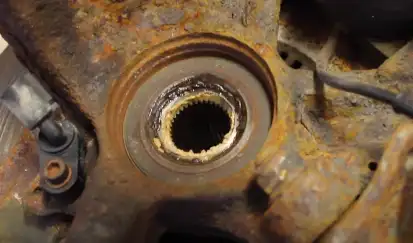
Solution
Rock the wheels back and forth with a dial indicator (our pick) on the wheel hub. You should replace the wheel bearing if the reading is more significant than 0.005.
See Also: Can Abs Cause Brake Pedal To Go To The Floor?
9. Bad Drive Shaft
The driveshaft is a mechanical component that connects the transmission to the wheels and helps to transfer power from the engine to the wheels. If you hear thumping or vibrating noises coming from under your vehicle while turning or accelerating, it could be a drive shaft problem.
Worn-out bearings, a loose drive shaft, damaged tubing, and worn-out U-joints are the most common causes of a faulty drive shaft.
Solution
Replace the bearings, tubing, and u-joints if damaged. If the drive shaft is damaged, tighten the u-joints.
10. Damaged Differential
A differential is a mechanical device that enables a pair of wheels to rotate at different speeds, allowing a vehicle to make turns smoothly. A damaged differential can show symptoms such as difficulty turning, thumping noises, and decreased overall performance.
Here are some common types of differential damage
- Broken Teeth: The teeth on the differential gears can break due to metal fatigue, high mileage, or hard use.
- Leaking Seals: The differential has several seals that keep the lubricant inside and prevent dirt and debris from entering. If the seals fail, the lubricant can leak out, causing damage to the gears and bearings.
- Worn Bearings: The differential bearings can wear out due to high mileage, hard use, or lack of lubrication.
Solution
Replace the damaged gears, seals, and bearings with new ones. Also, fill the differential with new lubricant.
See Post: Car Heater Blowing Warm Air Not Hot
Frequently Asked Questions (FAQs)
Here are other related questions.
Should I diagnose and fix the car thumping issue on my own?
If you’re comfortable performing essential car maintenance and have some mechanical knowledge, you can diagnose and fix the issue independently. However, if you’re unsure or don’t have the necessary tools or expertise, it’s best to take your car to a trusted mechanic.
Is it safe to drive my car if it is making a thumping sound when I accelerate?
No, it is not safe. The thumping sound could indicate a severe problem that could cause further damage to your car and create a dangerous situation for you and other drivers. You should take your vehicle to a mechanic as soon as possible to have it inspected and repaired.
How can I prevent a thumping sound when accelerating?
Regular maintenance and inspections of your car’s drivetrain, suspension, and tires can help prevent issues leading to a thumping sound when accelerating.
Conclusion
Acceleration thumps can be frightening, but they don’t have to be a source of stress or anxiety. You can get back on the road with confidence and peace of mind if you understand the common causes of thumping sounds and follow these tips for diagnosing and fixing the problem.
Remember to perform regular maintenance and inspections on your vehicle’s components to avoid these problems in the first place. If you cannot diagnose or repair the problem on your own, always seek the assistance of a reputable mechanic to ensure that your vehicle runs safely and smoothly.

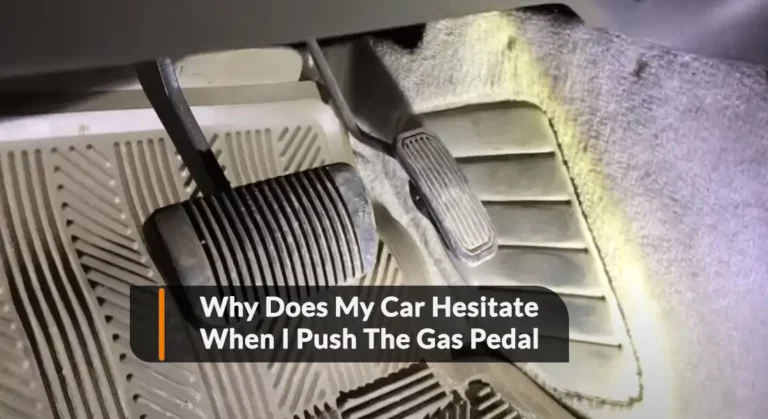
![Car Water Pump Bearing Noise [9 Fixes Explained]](https://taxiwiz.com/wp-content/uploads/2023/08/Water-Pump-Bearing-Noise-768x426.jpg)
